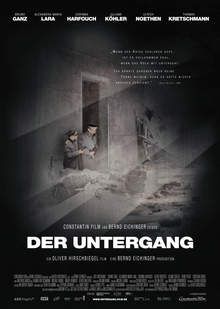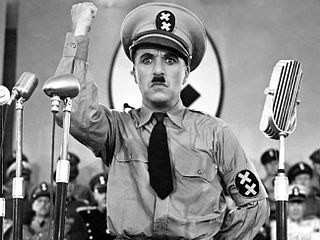Related Research Articles

The Geheime Staatspolizei, abbreviated Gestapo, was the official secret police of Nazi Germany and in German-occupied Europe.

Heinrich Luitpold Himmler was a German politician who was the 4th Reichsführer of the Schutzstaffel, a leading member of the German Nazi Party, and one of the most powerful men in Nazi Germany. He is primarily known for being one of the main architects behind the Holocaust.

Hermann Wilhelm Göring was a German politician, military leader, and convicted war criminal. He was one of the most powerful figures in the Nazi Party, which governed Germany from 1933 to 1945.

Reinhard Tristan Eugen Heydrich was a high-ranking German SS and police official during the Nazi era and a principal architect of the Holocaust.
The Resistible Rise of Arturo Ui, subtitled "A parable play", is a 1941 play by the German playwright Bertolt Brecht. It chronicles the rise of Arturo Ui, a fictional 1930s Chicago mobster, and his attempts to control the cauliflower racket by ruthlessly disposing of the opposition. The play is a satirical allegory of the rise of Adolf Hitler and the Nazi Party in Germany prior to World War II.

The Night of the Long Knives, also called the Röhm purge or Operation Hummingbird, was a purge that took place in Nazi Germany from 30 June to 2 July 1934. Chancellor Adolf Hitler, urged on by Hermann Göring and Heinrich Himmler, ordered a series of political extrajudicial executions intended to consolidate his power and alleviate the concerns of the German military about the role of Ernst Röhm and the Sturmabteilung (SA), the Nazis' paramilitary organization, known colloquially as "Brownshirts". Nazi propaganda presented the murders as a preventive measure against an alleged imminent coup by the SA under Röhm – the so-called Röhm Putsch.
The Sturmabteilung was the original paramilitary wing of the Nazi Party. It played a significant role in Adolf Hitler's rise to power in the 1920s and early 1930s. Its primary purposes were providing protection for Nazi rallies and assemblies, disrupting the meetings of opposing parties, fighting against the paramilitary units of the opposing parties, especially the Roter Frontkämpferbund of the Communist Party of Germany (KPD) and the Reichsbanner Schwarz-Rot-Gold of the Social Democratic Party of Germany (SPD), and intimidating Romani, trade unionists, and especially Jews.

Ernst Julius Günther Röhm was a German military officer and a leading member of the Nazi Party. Initially a close friend and early ally of Adolf Hitler, Röhm was the co-founder and leader of the Sturmabteilung (SA), the Nazi Party's original paramilitary wing, which played a significant role in Adolf Hitler's rise to power. He served as chief of the SA from 1931 until his murder in 1934 during the Night of the Long Knives.

Friedrich "Fritz" Thyssen was a German businessman, born into one of Germany's leading industrial families. He was an early supporter of the Nazi Party but later broke with it.
This is a list of words, terms, concepts and slogans of Nazi Germany used in the historiography covering the Nazi regime. Some words were coined by Adolf Hitler and other Nazi Party members. Other words and concepts were borrowed and appropriated, and other terms were already in use during the Weimar Republic. Finally, some are taken from Germany's cultural tradition.

Johanna Maria Magdalena "Magda" Goebbels was the wife of Nazi Germany's Propaganda Minister Joseph Goebbels. A prominent member of the Nazi Party, she was a close ally, companion, and political supporter of Adolf Hitler. Some historians refer to her as the unofficial "first lady" of Nazi Germany, while others give that title to Emmy Göring.

Downfall is a 2004 historical war drama film written and produced by Bernd Eichinger and directed by Oliver Hirschbiegel. It is set during the Battle of Berlin in World War II, when Nazi Germany is on the verge of total defeat, and depicts the final days of Adolf Hitler. The cast includes Alexandra Maria Lara, Corinna Harfouch, Ulrich Matthes, Juliane Köhler, Heino Ferch, Christian Berkel, Alexander Held, Matthias Habich, and Thomas Kretschmann. The film is a German-Austrian-Italian co-production.

Adolf Hitler, dictator of Germany from 1933 to 1945, has been represented in popular culture ever since he became a well-known politician in Germany. His distinctive image was often parodied by his opponents. Parodies became much more prominent outside Germany during his period in power. Since the end of World War II representations of Hitler, both serious and satirical, have continued to be prominent in popular culture, sometimes generating significant controversy. In many periodicals, books, and movies, Hitler and Nazism fulfill the role of archetypal evil. This treatment is not confined to fiction but is widespread amongst nonfiction writers who have discussed him in this vein. Hitler has retained a fascination from other perspectives; among many comparable examples is an exhibition at the German Historical Museum which was widely attended.

Karl Rudolf Werner Best was a German jurist, police chief, SS-Obergruppenführer, Nazi Party leader, and theoretician from Darmstadt. He was the first chief of Department 1 of the Gestapo, Nazi Germany's secret police, and initiated a registry of all Jews in Germany. As a deputy of SS-Obergruppenführer Reinhard Heydrich, he organized the World War II SS-Einsatzgruppen, paramilitary death squads that carried out mass-murder in Nazi-occupied territories.

Hitler's SS: Portrait in Evil is a 1985 American made-for-television war drama film about two German brothers, Helmut and Karl Hoffmann, and the paths they take during the Nazi regime. The movie was directed by Jim Goddard and starred John Shea, Bill Nighy, Tony Randall, David Warner and John Woodnutt. The film shows Karl, who was originally enthusiastic about the Nazi Party, becoming disillusioned and Helmut, who was at first wary of the Nazi Party, joining the Schutzstaffel (SS) and later being an accomplice to war crimes.

Wolf-Heinrich Julius Otto Bernhard Fritz Hermann Ferdinand Graf von Helldorff was an SA-Obergruppenführer, German police official and politician. He served as a member of the Landtag of Prussia during the Weimar Republic, as a member of the Reichstag for the Nazi Party from 1933, and as Ordnungspolizei Police President in Potsdam and in Berlin. From 1938 he became involved with the anti-Nazi resistance, and was executed in 1944 for his role in the 20th July plot to overthrow Adolf Hitler's regime.

Walter Buch was a German jurist as well as an SA and SS official during the Nazi era. He was Martin Bormann's father-in-law. As head of the Supreme Party Court, he was an important Party official. However, due to his insistence on prosecuting major Party figures on moral issues, he alienated Adolf Hitler, and his power and influence gradually diminished into insignificance. After the end of the Second World War in Europe, Buch was classified as a major regime functionary or Hauptschuldiger in the denazification proceedings in 1948. On 12 September 1949, he committed suicide.

In Nazi Germany, women were subject to doctrines of Nazism by the Nazi Party (NSDAP), which promoted exclusion of women from the political and academic life of Germany as well as its executive body and executive committees. On the other hand, whether through sheer numbers, lack of local organization, or both, many German women did indeed become Nazi Party members. In spite of this, the Nazi regime officially encouraged and pressured women to fill the roles of mother and wife only. Women were excluded from all other positions of responsibility, including political and academic spheres.
How Much Is Your Iron? is a short play by German modernist playwright Bertolt Brecht. Brecht wrote How Much Is Your Iron? in the fall of 1939 while in exile in Sweden, against the background of the approaching Second World War, following Nazi Germany's annexations of Austria and Czechoslovakia, against which Western powers such as Great Britain and France had at that stage not yet intervened. The play takes a critical look at Sweden's involvement with both Axis and Allied Powers in the build-up to World War Two. It is still produced regularly, playing in 2007 in London with a good review by The Guardian.
References
Notes
- ↑ Squiers, Anthony (2014). An Introduction to the Social and Political Philosophy of Bertolt Brecht: Revolution and Aesthetics. Amsterdam: Rodopi. p. 187. ISBN 9789042038998.
- ↑ Weber (1989, 136).
Bibliography
- Weber, Carl 1989. Introduction to The Battle. In The Battle: Plays, Prose, Poems by Heiner Müller. New York: Performing Arts Journal Publications. ISBN 1-55554-049-X. pp. 136–137.
- Willett, John (2015). Fear and Misery of the Third Reich. City: Bloomsbury Publishing. ISBN 9781472515230. English translation.